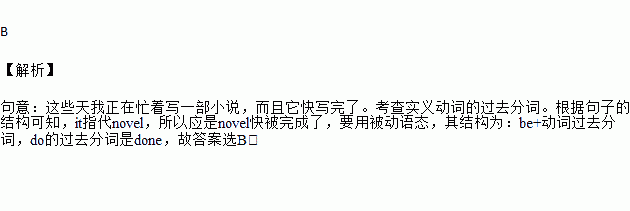题目内容
I am busy writing a novel these days and it is nearly ___________.
A. to do B. done C. doing D. do
练习册系列答案
相关题目
十、书面表达
请根据下表提示介绍Tom过去和现在的情况,并就此事谈谈你的看法及对他的建议。
过去 | 喜欢看书,功课好,花很多时间学习和锻炼 |
现在 | 因沉溺于玩电脑游戏和看电视导致对学习没兴趣,上课时不专心听讲。 |
你的看法 | 玩电脑游戏可以使人放松,但…… |
你的建议 | 至少两点 |
要求:1)书写规范整洁,80词左右;
2)短文必须包括表格中的信息,条理清晰,观点明确,意思连贯。

